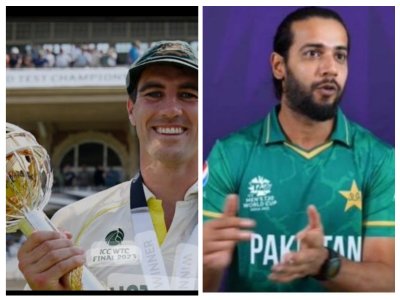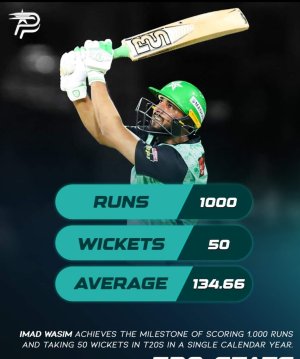What’s the use of all that glory if it is not for your own nation?

It is a great privilege for a player to receive a national cap. Many players spend their whole career yearning for one but are unable to get it. Thus, this makes a national cap so precious for a player but with it also comes added responsibility. So once a player gets an opportunity to represent their country at the international stage, they become a brand ambassador for their nation and thus every action thereafter bears great significance.
It is just because of this fact that great players always prioritize national call of duty over franchise cricket and engagements. A glaring example of it is when players like Pat Cummins, Mitchell Starc, and Ben Stokes who have sacrificed lucrative deals from different franchises to focus on their duties with their national squads and consequently have also got great dividends from it. For instance, last year Pat Cummins skipped playing in the IPL so he could focus on the forthcoming World Test Championship, Ashes series and the ODI World Cup. This decision turned out to be an auspicious one for him as his side managed to end up as victors in all of those events.
In contrast to above phenomenon, we witness a deploring trend in Pakistan where good talented players like Muhammad Amir and Imad Wasim have sought an early exit from international cricket to venture their luck in the franchise cricket but at the same time it is encouraging to note that players like Shadab Khan, Ahmed Shehzad, Babar Azam and Iftikhar Ahmed have turned down offers of various overseas franchises just to ensure their availability for their national and domestic teams. And that is the sort of commitment that Pakistan needs from its star performers to excel well in future.
There are many players who get dropped from their national teams because of a dip in their performance and then they are supposed to perform well in the domestic circuit to forge their way back into the national side. But some players, due to their big egos prefer not to feature in domestic games as it appears to them as self abasing. But in reality, many great players like Imran Khan, MS Dhoni, Sachin Tendulkar, Misbah-ul-Haq, Younis Khan etc. have played great deal of domestic cricket in their professional careers because they knew that it is the best place to figure out the drawbacks, lacunas in their own techniques and sort them out. Therefore, great players always prefer to be a part of the domestic circuit.
Another testimonial in favor of domestic cricket came last month when England’s batting stalwart Joe Root attributed the root cause of England’s flop run in ODI Cricket World Cup to a lack of domestic cricket run by the English players.
But recently, we have seen a disturbing trend of players skipping domestic cricket to play in different franchise leagues around the world. This could be attributed to the glamour and lucrative financial deals that come along with these league contracts. Also, this phenomenon lures players into a pit in which they prefer personal gains over their national duties.
But a pertinent thing to note here is that no matter how big your achievement in a franchise league, it would always pale in comparison to a success with your national side. For instance, players like Hardik Pandya and Jasprit Bumrah suffer a lot of criticism for their lack of any silverware achievement with their national side despite having multiple franchise league titles under their belt. In contrast, a player like Michael Clark gets overwhelming appreciations from every quarter of the cricketing world because he won Australia an ODI World Cup. In fact, this is a great manifestation of the fact that fans value national glory more than anything else.
Another demerit point of skipping national and domestic tournaments is that the senior players become unable to pass the torch and share their skills with the upcoming youth sensations and consequently these young guns are unable to find their feet in International arena due to lack of proper guidance. As mentioned before, to represent your country is a great honor but at the same time you must repay this favor by rendering your services to your nation. Thus, players must ensure their presence for their respective national and domestic sides to support newcomers, hone their own playing skills and eliminate flaws in their own techniques. Also, it is wort noting that no player can ever achieve greatness unless he devotes himself to the national duty. As it takes time to achieve greatness and for it a prolonged career is an ideal option. Thus, players who quit early to chase money in foreign leagues are unable to accomplish this goal and thus end up in the pond of oblivion and irrelevancy.
The example of talented players like Colin Ingram and Mitchell McClenaghan are there for everyone to behold. These players forsake their national side early in their career to chase money overseas but failed to make an indelible impression for themselves. Another example of this phenomenon are the cases of players like Muhammad Amir and Imad Wasim who exiled themselves from international cricket and had an opportunity to make a comeback into the national squad by performing well in the domestic setup, but they preferred not to. Maybe, because they had their own set of priorities. Thus, these shortsighted actions of players not only ruined their own careers but also deprived their nations from their serious talents.
Pakistani cricketers need to take some prudence from the above stated examples or else risk spoiling their own careers. Recently, Pakistan’s star batter Ahmed Shehzad also made the same point in an interview. He said, “It’s not a good idea to forsake national side for foreign leagues because if your performance goes bad in any of these leagues it travels to other leagues also and then you don’t get any second chance either.”
So, the crux of all this discourse is that the players should prioritize national duty over short term financial gains. To achieve greatness and register their name into the annals of cricketing greats you need a prolonged career like Shahid Afridi, Sachin Tendulkar, Ricky Ponting, and Brian Lara etc. Although you can become famous by having an impressive short career like Quinton de Kock, but you would never be deemed as a legend of the cricket unless you scale new heights in the game of cricket through an extended run to your professional career.

It is a great privilege for a player to receive a national cap. Many players spend their whole career yearning for one but are unable to get it. Thus, this makes a national cap so precious for a player but with it also comes added responsibility. So once a player gets an opportunity to represent their country at the international stage, they become a brand ambassador for their nation and thus every action thereafter bears great significance.
It is just because of this fact that great players always prioritize national call of duty over franchise cricket and engagements. A glaring example of it is when players like Pat Cummins, Mitchell Starc, and Ben Stokes who have sacrificed lucrative deals from different franchises to focus on their duties with their national squads and consequently have also got great dividends from it. For instance, last year Pat Cummins skipped playing in the IPL so he could focus on the forthcoming World Test Championship, Ashes series and the ODI World Cup. This decision turned out to be an auspicious one for him as his side managed to end up as victors in all of those events.
In contrast to above phenomenon, we witness a deploring trend in Pakistan where good talented players like Muhammad Amir and Imad Wasim have sought an early exit from international cricket to venture their luck in the franchise cricket but at the same time it is encouraging to note that players like Shadab Khan, Ahmed Shehzad, Babar Azam and Iftikhar Ahmed have turned down offers of various overseas franchises just to ensure their availability for their national and domestic teams. And that is the sort of commitment that Pakistan needs from its star performers to excel well in future.
There are many players who get dropped from their national teams because of a dip in their performance and then they are supposed to perform well in the domestic circuit to forge their way back into the national side. But some players, due to their big egos prefer not to feature in domestic games as it appears to them as self abasing. But in reality, many great players like Imran Khan, MS Dhoni, Sachin Tendulkar, Misbah-ul-Haq, Younis Khan etc. have played great deal of domestic cricket in their professional careers because they knew that it is the best place to figure out the drawbacks, lacunas in their own techniques and sort them out. Therefore, great players always prefer to be a part of the domestic circuit.
Another testimonial in favor of domestic cricket came last month when England’s batting stalwart Joe Root attributed the root cause of England’s flop run in ODI Cricket World Cup to a lack of domestic cricket run by the English players.
But recently, we have seen a disturbing trend of players skipping domestic cricket to play in different franchise leagues around the world. This could be attributed to the glamour and lucrative financial deals that come along with these league contracts. Also, this phenomenon lures players into a pit in which they prefer personal gains over their national duties.
But a pertinent thing to note here is that no matter how big your achievement in a franchise league, it would always pale in comparison to a success with your national side. For instance, players like Hardik Pandya and Jasprit Bumrah suffer a lot of criticism for their lack of any silverware achievement with their national side despite having multiple franchise league titles under their belt. In contrast, a player like Michael Clark gets overwhelming appreciations from every quarter of the cricketing world because he won Australia an ODI World Cup. In fact, this is a great manifestation of the fact that fans value national glory more than anything else.
Another demerit point of skipping national and domestic tournaments is that the senior players become unable to pass the torch and share their skills with the upcoming youth sensations and consequently these young guns are unable to find their feet in International arena due to lack of proper guidance. As mentioned before, to represent your country is a great honor but at the same time you must repay this favor by rendering your services to your nation. Thus, players must ensure their presence for their respective national and domestic sides to support newcomers, hone their own playing skills and eliminate flaws in their own techniques. Also, it is wort noting that no player can ever achieve greatness unless he devotes himself to the national duty. As it takes time to achieve greatness and for it a prolonged career is an ideal option. Thus, players who quit early to chase money in foreign leagues are unable to accomplish this goal and thus end up in the pond of oblivion and irrelevancy.
The example of talented players like Colin Ingram and Mitchell McClenaghan are there for everyone to behold. These players forsake their national side early in their career to chase money overseas but failed to make an indelible impression for themselves. Another example of this phenomenon are the cases of players like Muhammad Amir and Imad Wasim who exiled themselves from international cricket and had an opportunity to make a comeback into the national squad by performing well in the domestic setup, but they preferred not to. Maybe, because they had their own set of priorities. Thus, these shortsighted actions of players not only ruined their own careers but also deprived their nations from their serious talents.
Pakistani cricketers need to take some prudence from the above stated examples or else risk spoiling their own careers. Recently, Pakistan’s star batter Ahmed Shehzad also made the same point in an interview. He said, “It’s not a good idea to forsake national side for foreign leagues because if your performance goes bad in any of these leagues it travels to other leagues also and then you don’t get any second chance either.”
So, the crux of all this discourse is that the players should prioritize national duty over short term financial gains. To achieve greatness and register their name into the annals of cricketing greats you need a prolonged career like Shahid Afridi, Sachin Tendulkar, Ricky Ponting, and Brian Lara etc. Although you can become famous by having an impressive short career like Quinton de Kock, but you would never be deemed as a legend of the cricket unless you scale new heights in the game of cricket through an extended run to your professional career.








